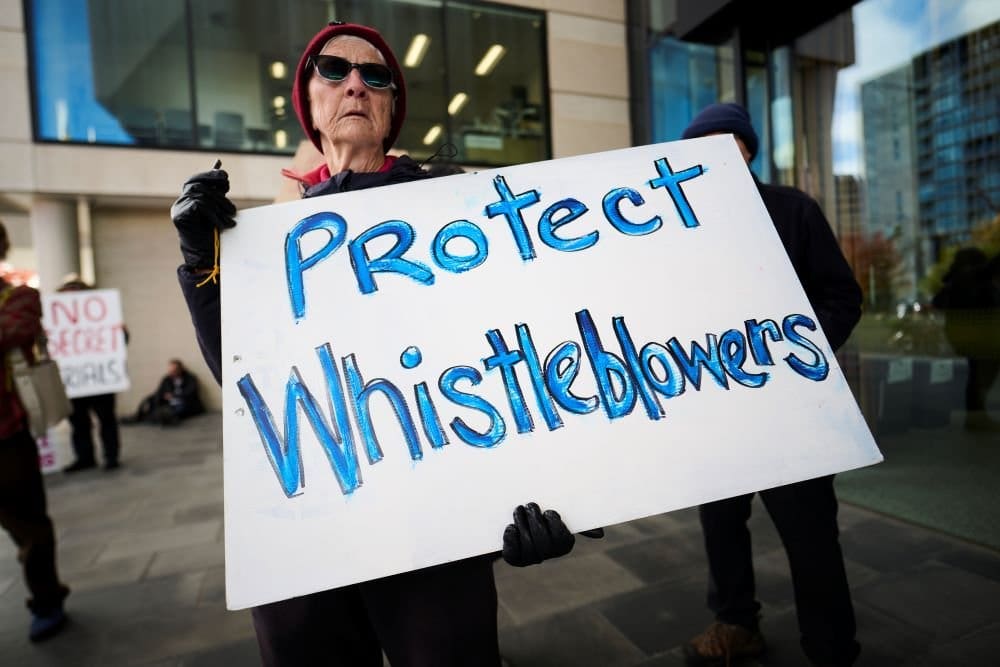New evidence shows right to protest in peril in Australia
Governments across Australia must repeal anti-protest laws and introduce reforms which protect protest, the Human Rights Law Centre said on release of a new report.
The Protest in Peril report analysed and compiled every single bill across Australia over the last two decades which has impacted upon the right to protest, and has found people’s ability to come together freely and peacefully to speak out on issues they care about is being steadily eroded in Australia.
Peaceful protest has been critical to advancing reforms we now take for granted, like women’s voting rights, workplace safety, and the protection of the environment from pollution. But the right to protest continues to be under attack by governments and institutions.
Governments across Australia have criminalised people who are peacefully protesting by proliferating a worrying number of anti-protest laws. Over the past two decades, 49 laws affecting protest have been introduced in federal, state and territory parliaments. New South Wales has introduced the most anti-protest laws, while South Australia has the toughest financial penalties with fines of up to $50,000 for common protests.
The report found that these laws disproportionately targeted environmental defenders and people advocating for action on climate change.
David Mejia-Canales, Senior Lawyer at the Human Rights Law Centre said:
“The right to protest is fundamental to our democracy. Protest has been crucial to achieving many historic human rights achievements, from First Nations people’s right to vote, to the eight-hour workday. 41 years ago — almost to the day — communities won the campaign to save the Franklin River from being destroyed by the Tasmanian Government, through peaceful (if disruptive) protest. We celebrate this part of Australian history, while we criminalise the protests of human rights movements of today.
“Our right to protest must be protected so that all of us can challenge and hold governments and corporations to account. But over the last 20 years, governments across Australia have attempted to silence those who speak out by attacking our fundamental rights which are poorly protected in our laws. Governments across Australia can change course, by repealing anti-protest laws and introducing human rights acts across federal, state and territory governments. These would provide clear rules for governments on how to balance and protect basic rights for everyone in the community.”
Nikita White, Campaigner at Amnesty International Australia said:
“Protest is not only the exercise of fundamental human rights, it is also how many people, throughout history, have realised their human rights and made the world a better place.
“Today we face an unprecedented attack on people’s right to protest; from the violent repression of protests around the world, to laws in Australia that impose prison sentences and tens of thousands of dollars in fines on people taking part in non-violent civil disobedience.
“In the face of this unprecedented attack on the right to protests, Amnesty International calls on governments to change course, and to send a clear message that protest will be protected and respected.”
Anastasia Radievska, Protest Rights Campaigner at Australian Democracy Network said:
“Over 130 community organisations have endorsed the Declaration of our Right to Protest, which affirms the minimum standards for protection of protest in a democracy – civil society stands firmly behind the right to protest. The Human Rights Law Centre’s report shows that Australia is falling far short of these protections and is going backwards on protest rights at an accelerating pace. Communities are less and less able to use public space for political communication.”
Quotes from Amnesty International Australia community activist stories
“My future is on the line, I can’t be at school right now, I’m trying to save my future because my government isn’t” – Varsha Yajman on the School Strike 4 Climate rallies she helped organise.
“There are lots of causes that need to be changed, if you can do that together by being visible and being in the streets with a placard, chanting and marching, that promotes the issue and that is really important” – Peter De Waal on being involved in the Rainbow Rights protest movement.
“There is something healing about being able to share your story” – Apryl Day on fighting for justice for her mum, Aunty Tanya Day.
Background
New South Wales, South Australia, Tasmania, Victoria and Queensland have all passed anti-protest laws that impose severe penalties on people for engaging in peaceful protest in the last five years. In response, the Human Rights Law Centre and Australian Democracy Network launched the Declaration of Our Right to Protest last year, outlining the minimum standards for protection of protest in a democracy. The Declaration has been endorsed by 130 civil society organisations.

INCLO members stand in solidarity with Al-Haq against US sanctions and call for immediate reversal of decision
The International Network of Civil Liberties Organisations, including the Human Rights Law Centre stands in solidarity with Al-Haq, a Palestinian organisation of human right defenders which has been sanctioned by the US Government.
Read more
Albanese Government’s progress on whistleblower reform welcomed
The Albanese Government’s announcement on the next phase of public sector whistleblowing reform is a positive step forward for protecting and supporting whistleblowers.
Read more
Statement on the neo-Nazi violence and racism on 31 August
The Human Rights Law Centre strongly condemns the neo-Nazi violence towards First Nations people and the racial vilification of migrant and refugee communities on 31 August.
Read more



